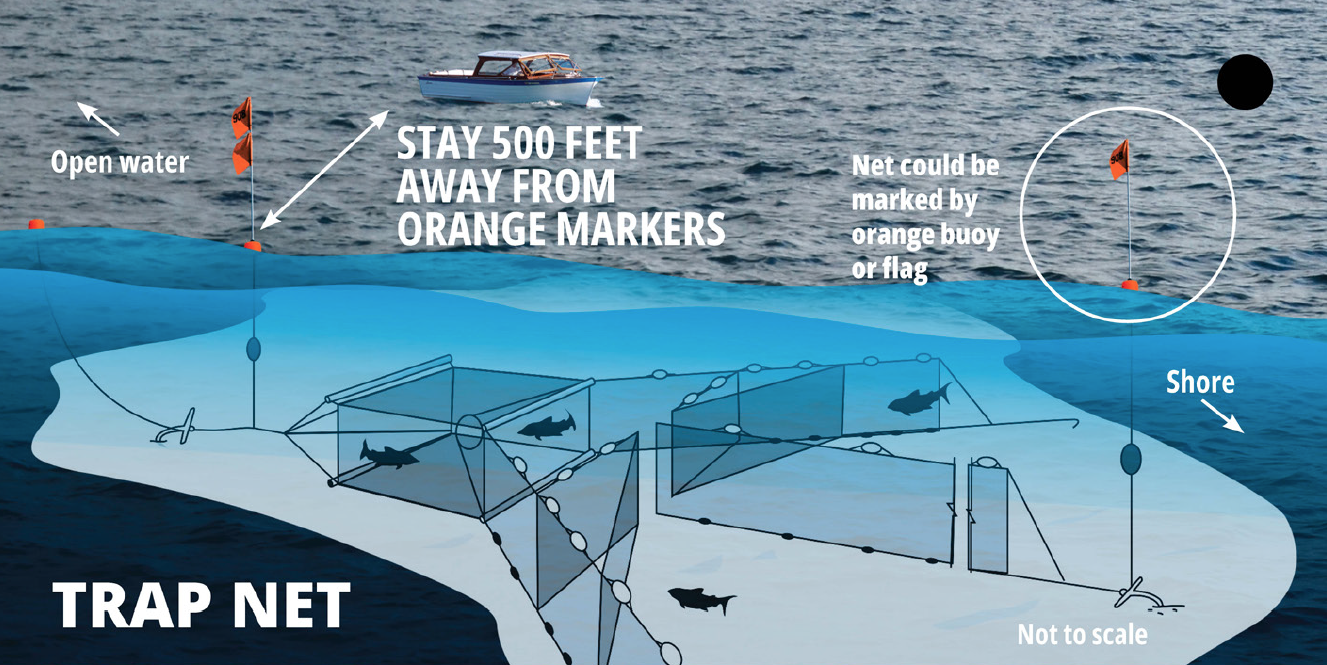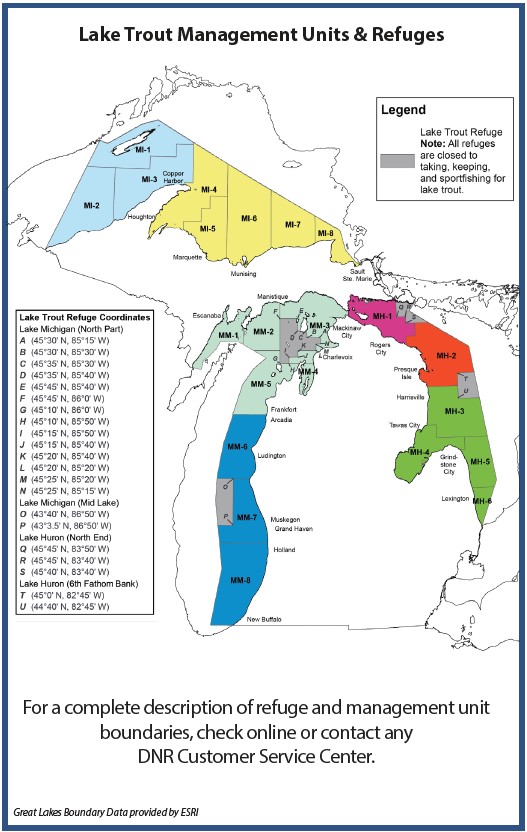Great Lakes Trout & Salmon Regulations
The regulations in this table apply to fishing on the Great Lakes for the following species: Atlantic Salmon, Brook Trout (NOTE 1), Brown Trout, Chinook Salmon, Coho Salmon, Lake Trout (NOTE 3), Pink Salmon, Rainbow Trout (Steelhead) and Splake (NOTE 3). See regulations that pertain to fishing for trout and salmon on inland waters.
Great Lakes Trout & Salmon Regulations
| Seasons by Water Type | Minimum Size | Daily Possession Limit (NOTES 1, 2, 3) |
|---|---|---|
Open All Year: (NOTE 3) L. Superior, L. Michigan, L. Erie, L. Huron, L. St. Clair, St. MarysR., St. Clair R. and Detroit R. | 10" (NOTES 1, 3) (also see Lake Trout and Splake Regulations table) | Great Lakes, L. St. Clair, St. Marys R.,St. Clair R., and Detroit R.: 5 total in any combination; no more than 3 of any one species, except up to 5 Coho, Chinook or Pink Salmon allowed. On the St. Marys R.: 5 additional Pink Salmon allowed from last Sat. in April - Sep. 30. |
NOTE 1
Brook Trout: For L. Superior, the minimum size limit for Brook Trout is 20" and possession limit is 1 fish. Within 4.5 miles of Isle Royale (Isle Royale National Park waters), catch-and-immediate-release; no possession.
NOTE 2
Drowned River Mouth Lakes: On the following inland waters trout and salmon regulations are as follows: 5 total trout and salmon in any combination; no more than 3 of any one species, except up to 5 coho or Chinook Salmon; minimum size limit is 10"; fishing season and possession season are open all year. For all other species of trout and salmon, the possession season is open all year. Allegan: Kalamazoo and Silver Lks. Benzie: Betsie L. Charlevoix: L. Charlevoix (including Round L.) Manistee: Arcadia, Manistee, and Portage Lks. Mason: Pere Marquette L. Muskegon: Duck, Mona, Muskegon, and White Lks. Oceana: Pentwater, Silver, and Stony Lks. Ottawa: Macatawa and Pigeon Lks.
NOTE 3
Lake Trout and Splake Regulations: Lake Trout and Splake regulations for the Great Lakes are listed by Lake Trout Management Unit (see Lake Trout and Splake Regulations table). The daily possession limit for Lake Trout and Splake is now combined, in any combination. To help identify Management Unit boundaries, a few major ports are listed for each.
Michigan's Creel Survey Program
A "creel" is a basket used to collect fish. The Michigan creel survey program is used to collect fish data! When returning from your fishing trip, you may find a creel clerk waiting to interview you and take samples from your fish. Creel clerks collect information about the length of your fishing trip and what fish you caught and released. Biologists use this data to study fish populations, evaluate stocking, and measure the impact of fishing regulations. Creel clerks also want to listen to your concerns and answer questions. The next time you see a friendly face in a DNR shirt approaching you with a clipboard, introduce yourself! We appreciate your participation in the survey and thank you for your time.
Look for Orange: Trap Nets
Commercial fishing is an active industry in Michigan waters, feeding Michiganders with fresh, local, and sustainable wild-caught fish.
- Orange flags (or buoys) indicate trap nets below surface. Nets can cover 1+ acres on lake bottom and can be dangerous if snagged.
- Single flag marks shallower end of net near shore. Double flag marks deeper end farther from shore.
Stay Safe
- Pull in fishing gear, TURN AWAY from visible marker, and navigate out of the area:
- If additional flags are visible, DO NOT pass between markers. Give a wide berth.
- Additional flags could be out of sight. Waves, glare, fog, or low light also limit visibility.
- Stay mindful in surrounding waters for more nets or floating ropes. Give a wide berth.
If You Get Tangled
- Put boat in NEUTRAL or TURN OFF engine if prop is tangled.
- CUT yourself free using wire cutters. Label fishing gear to be returned to you.
- MARK location on GPS. Attach buoy or jug to mark net for officials. Leave net in water.
- REPORT GPS coordinates to agencies:
- Michigan Department of Natural Resources (MDNR) hotline: (800) 292-7800
- Great Lakes Indian Fish and Wildlife Commission (GLIFWC): (715) 685-2113
- Chippewa Ottawa Resource Authority (CORA): (906) 632-0043


